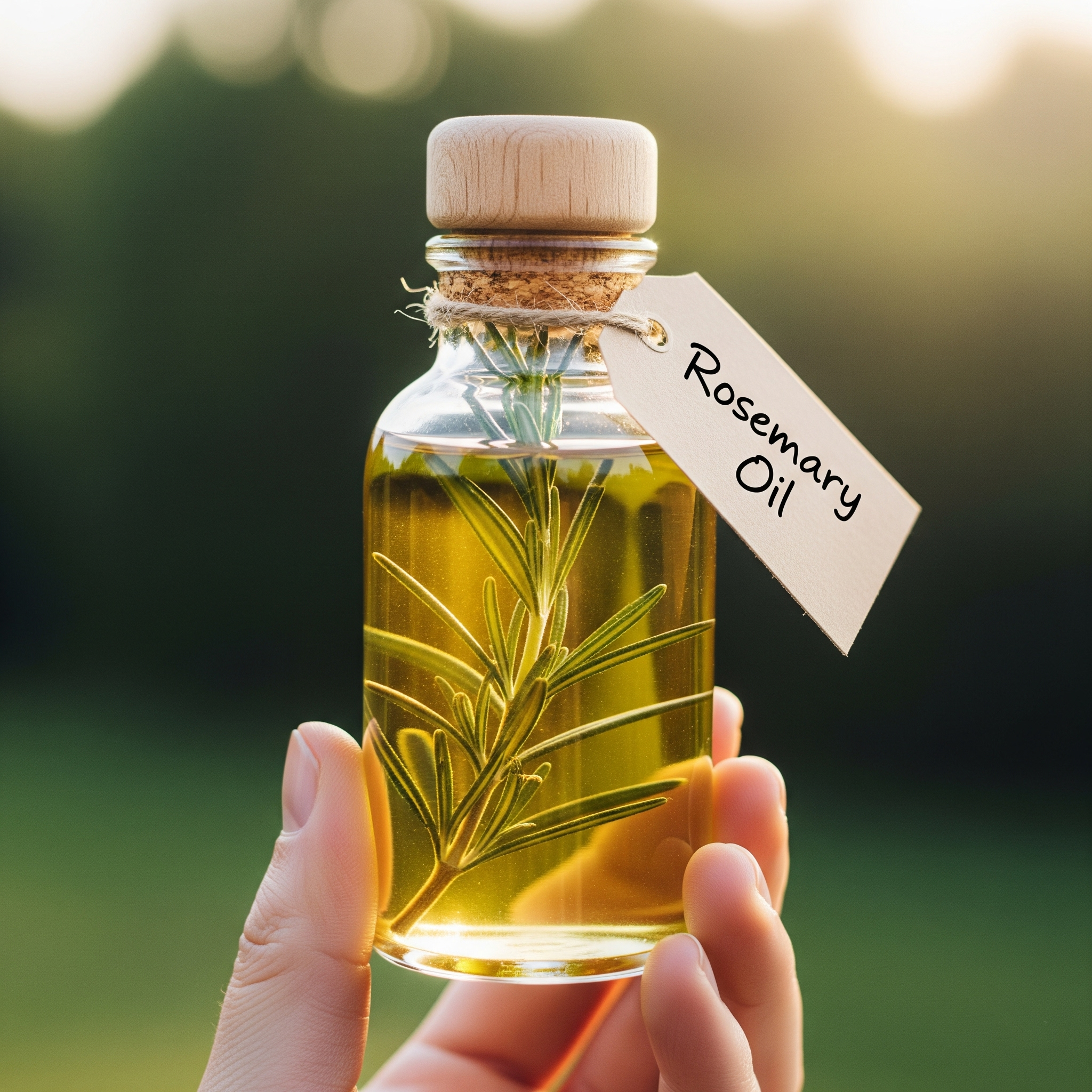Hair fall, thinning, and slow growth have become common struggles in today’s fast-paced world. With increased exposure to pollution, stress, and chemical-laden products, many are seeking natural remedies that are safe, affordable, and effective. Rosemary oil is one such powerful solution.
Used for centuries in folk medicine, rosemary oil is now backed by emerging scientific studies showing its potential in promoting hair regrowth, improving scalp health, and even performing on par with chemical treatments like minoxidil—without the unwanted side effects.
Why rosemary oil works wonders for your scalp
Rosemary oil is known to stimulate blood circulation in the scalp, which helps awaken dormant hair follicles and supports new hair growth. It contains carnosic acid, a potent antioxidant that helps repair tissue and nerve damage in the scalp—one of the lesser-known contributors to hair loss.
Here are more reasons why rosemary oil deserves a spot in your hair care routine:
-
Boosts blood flow to the scalp, feeding follicles with nutrients.
-
Contains antioxidants that protect against damage and support regeneration.
-
Fights dandruff and itchiness with anti-inflammatory and antibacterial properties.
-
Balances oil production, helping both dry and oily scalps.
-
May reduce shedding, especially when caused by hormonal imbalance or stress.
In fact, some studies suggest that rosemary oil is just as effective as over-the-counter treatments like minoxidil—but without the irritation.
What you need to make rosemary oil serum

Creating this serum at home is simple and customizable based on your hair type. Here’s what you’ll need:
-
2 tablespoons of fresh or dried rosemary
-
100 ml of carrier oil (choose coconut oil for dry scalp, castor oil for thickness, jojoba or sweet almond for light hydration)
-
5–10 drops of rosemary essential oil (optional, for a stronger boost)
-
1 capsule or 5 drops of vitamin E oil (optional, for added nourishment and shelf life)
-
A clean glass dropper bottle for storage and easy application
Step-by-step guide to making rosemary oil serum at home

Step 1: Infuse the rosemary
Place the rosemary into a small saucepan and pour your chosen carrier oil over it. Set the heat to low and let the mixture simmer gently for 20–30 minutes. Do not boil. The heat helps extract the beneficial compounds from the rosemary leaves.
Step 2: Strain and cool
Once the mixture cools, strain out the rosemary using a fine strainer or muslin cloth. You’ll be left with a nutrient-rich, herb-infused oil.
Step 3: Add essential oils (optional but powerful)
To amplify the serum, add rosemary essential oil and vitamin E oil. Stir to combine.
Step 4: Store for future use
Transfer the serum into a clean glass bottle with a dropper. Store it in a cool, dark place. It stays potent for up to 6 months.
How to use rosemary oil serum for maximum hair growth
Creating the serum is just the beginning—how you use it is what determines results.
1. Massage it into the scalp (2–3 times per week)
Use a few drops of the serum and massage your scalp with your fingertips for 5–10 minutes. This not only nourishes the follicles but also boosts blood circulation and relaxes tension.
2. Leave it on overnight or for a few hours
For deeper conditioning, leave the serum on overnight and wash it off in the morning using a sulfate-free shampoo. If short on time, leaving it in for 2–3 hours still delivers benefits.
3. Add a few drops to your shampoo or conditioner
For a low-maintenance approach, mix a few drops of rosemary essential oil into your daily shampoo or conditioner. This allows you to get consistent exposure with each wash.
4. Use as a scalp mist or tonic
For lighter use, dilute the serum with water or aloe vera juice in a spray bottle. Spritz it onto your scalp as a leave-in spray, especially after workouts or before bed.
When to expect visible results
Rosemary oil is not a miracle overnight treatment, but it’s highly effective with consistent use. Some users report reduced hair fall and early regrowth (baby hairs) within 2–3 weeks. More noticeable changes in hair thickness and length generally appear within 2–3 months of regular use.
Tips to boost results
-
Use after derma rolling: Applying the oil after microneedling can improve absorption and stimulation.
-
Wrap with warmth: After applying the oil, wrap your head in a warm towel to open up the follicles.
-
Support with nutrition: Eat a diet rich in protein, biotin, iron, and zinc. What you eat directly affects hair growth.
-
Avoid harsh products: Stick to sulfate-free, alcohol-free hair products to avoid stripping your scalp.
Who should avoid rosemary oil?
Though rosemary oil is natural, it’s not suitable for everyone. You should avoid it if:
-
You are pregnant or breastfeeding (consult your doctor first)
-
You have highly sensitive skin (always perform a patch test)
-
You are on prescription hair loss treatments (check for interactions)
Rosemary oil vs. rosemary essential oil
It’s important not to confuse rosemary oil with rosemary essential oil. The latter is highly concentrated and made through steam distillation. It should never be used directly on the scalp without dilution. The infused rosemary oil made at home is milder and safer for direct application.
Are there side effects?
While rosemary oil is generally safe, some people may experience:
-
Mild itching or irritation, especially if not diluted properly
-
Allergic reactions, although rare
-
Increased sun sensitivity, so avoid sun exposure after applying directly to the scalp
Always perform a patch test before using a new product, especially if you have sensitive skin.
Debunking common myths about rosemary oil
Myth: Rosemary oil works overnight.
Truth: Visible results take several weeks to months. Hair health depends on many factors including consistency, genetics, and overall care.
Myth: It works for everyone.
Truth: Rosemary oil is highly effective for many people, but not all scalp conditions or causes of hair loss will respond equally.
Does rosemary water also help with hair growth?
Yes. Rosemary water, made by steeping rosemary leaves in water, contains some of the same growth-stimulating compounds like carnosic acid and rosmarinic acid. While it’s not as concentrated as oil, it can be used as a daily scalp rinse or spray to support scalp health and encourage growth.
Is rosemary oil better than castor oil?
Both oils offer unique benefits:
-
Rosemary oil improves circulation, stimulates follicles, and reduces inflammation.
-
Castor oil is rich in fatty acids that nourish the scalp and strengthen hair strands.
The best oil depends on your hair type and concern. You can even combine both in your serum for maximum benefit.
Final thoughts
Rosemary oil is a natural powerhouse that can transform your hair health when used correctly. With its ability to stimulate blood flow, calm the scalp, and nourish follicles, it’s no wonder this herb has stood the test of time in traditional medicine.
Making your own rosemary oil serum is easy, inexpensive, and effective. Whether you’re trying to recover from postpartum hair loss, stress-induced shedding, or simply want thicker, fuller hair, this DIY remedy is worth adding to your weekly routine.
Be consistent, stay patient, and let your hair flourish—naturally.
